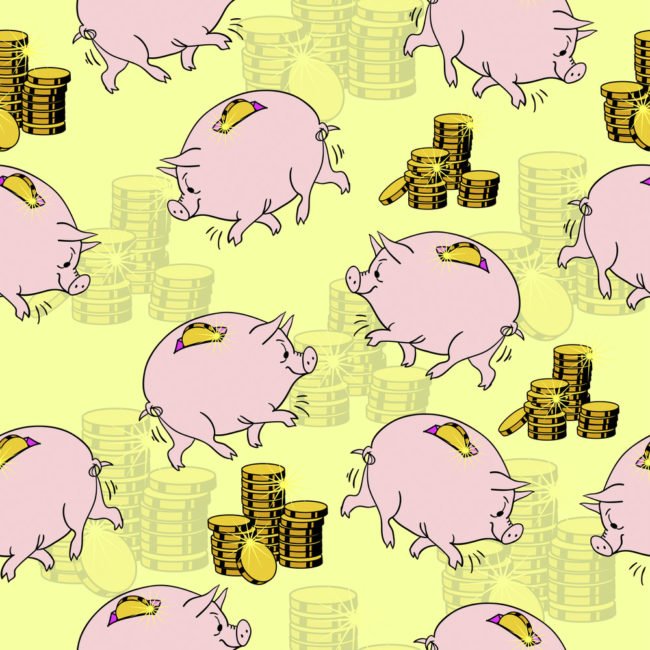Last updated on February 26th, 2023 at 12:35 am
 When I started writing about my dream to master my personal finances, I judged myself and my money behavior a failure. I was hog-tied by shoulds and shouldn’ts.
When I started writing about my dream to master my personal finances, I judged myself and my money behavior a failure. I was hog-tied by shoulds and shouldn’ts.
I should have three months of emergency savings.
I should be prepared to pay for my children’s college educations.
I shouldn’t spend so impulsively.
I should learn to talk to my partner about money instead of fearing the conversation. I could go on and on.
At the root of those shoulds and shouldn’ts is a cultural imperative to save money. Saving money = good, responsible, smart behavior. Spending money = foolish, stupid, bad behavior.
Granted, we get lots of mixed marketing messages about this – in fact, downright schizophrenic marketing messages. Spend everything you have, and then get…
a credit card so you can spend more! At the same time, invest in the stock market, and stay in it for the long term.
Don’t overdraw your checking account, we’ll charge you $39. Hey, want to sign up for overdraft protection, where we approve your debit card purchase for $1.49 and charge you $39 if you only have $1 in your account?
If you don’t have a 401(k), that’s just stupid.
But also, spend every dime of your savings to buy a house, and while you’re at it, be sure to buy more house than you can afford.
Can’t make your mortgage payment? That’s YOUR problem. You shouldn’t have bought so much house.
Underneath all those apparent contradictions, there is a common foundation. It’s this: accumulating wealth is the pinnacle of success, and, perhaps even more importantly, not accumulating wealth marks you as a failure.
Whatever you have to do to accumulate wealth is really the only thing worth doing. No wealth? You wasted your life.
I bought into that belief system without really thinking about it. I believed I was a failure because I hadn’t accumulated wealth.
I bought a house because I hadn’t accumulated wealth, and believed that would be the fastest way to catch up (funny, funny girl). I castigated myself for every book bought and every skein of yarn added to my collection – no matter how much joy it gave me – because that was getting in the way of accumulating wealth.
I never got to be good at hoarding money, but I sure got good at convincing myself that’s what I needed to do. And when I started writing at 8 Women Dream, I did it with the goal of turning my failed, shameful behavior around.
Some of my behavior has changed, but some haven’t. And you know what? I don’t feel ashamed anymore.
My financial circumstances are not much different than when I started writing about my finances, and yet instead of feeling like a failure and a loser, I feel proud. Why? Because I spend as much money as I possibly can. The difference is, I spend it mindfully and locally.
And like I said, this shift from shame to pride happened so gradually that I didn’t even really realize it until I was reading The Art of Fermentation by Sandor Ellix Katz. I came across a statement in the book that so perfectly defined my relationship with money that I had to close the book and take a breath.
It’s not a big statement; in fact, it’s something Katz writes in passing. Talking about the importance of localizing food production, he says:
“By supporting this local food revival, we recycle our dollars into our communities.”
What a shift in consciousness that is! From hoarding and holding to recycling.
Hoarding and holding money enriches individuals, but recycling money enriches whole communities. Hoarding and holding money are about compromising the quality of life today and putting off real life until tomorrow. Recycling money is about quality of life today and at the same time about building a better future.
Hoarding and holding money is about saying no, and recycling money is about choosing ways to say yes.
Recycling money locally is about what it means to be fully human: not isolated, not scrapping our way to the top of the heap, not protecting what’s mine, and making sure no one else gets their greedy mitts on it – but depending on one another, trusting our neighbors, trading what we have for what we need.
It’s about making truly useful things with our hands and applying our creativity–all of us, not just a few white-collar executives who get stock options and six-figure bonuses.
And it’s about recognizing the true costs of things. The costs extend beyond the dollars we spend, into the world we inhabit and the lives we touch.
Even more importantly, recycling dollars locally means it’s much, much easier for us as consumers to know what we’re getting.
There are no mega-marketing campaigns to obfuscate the facts. There are no hiding scandalous production methods. There’s no getting away with polluting the local watershed and enslaving the local illegals. Why? Because your dollar has way more power when it’s recycled a block away than when it’s diluted with the dollars of millions of other consumers around the world.
Your local business owners need your dollar. They can’t take it or leave it. They can’t risk making you unhappy. They literally need every dollar you’re willing to spend in order to survive.
In other words, when you recycle your money locally, you are not disposable. You’re indispensable.
And that’s how I’ve gone from ashamed to proud. My dollars – as many of them as possible, and a growing percentage every day – are going to local businesses. I’m recycling my dollars. They’re evolving from one commodity (my work) to another (the things I need). I can see the results of my recycling.
And that is a whole new money dream indeed.
———-
Jayne Speich
Jayne Speich is a small business coach and E-Myth consultant who writes thinks and coaches extensively on customer service, business finance, and ways to thrive in the new economy.

Enjoy this special 8WomenDream Guest Contributor story submitted by new and experienced big dreamers throughout the world, edited and published to capture a dream perspective from different points of view. Do you have a personal dream story to share with 8WomenDream readers? Click here to learn how to submit dream big articles for consideration.
Note: Articles by Guest Post Contributors may contain affiliate links and may be compensated if you make a purchase after clicking on an affiliate link.




